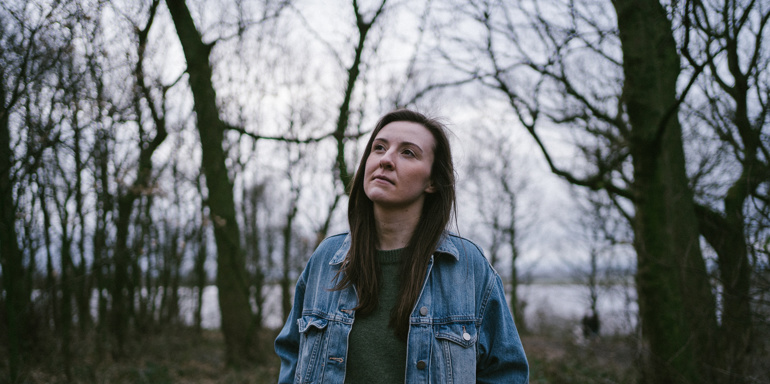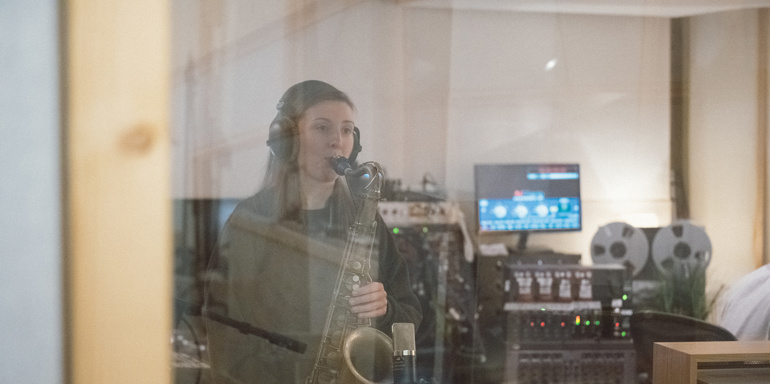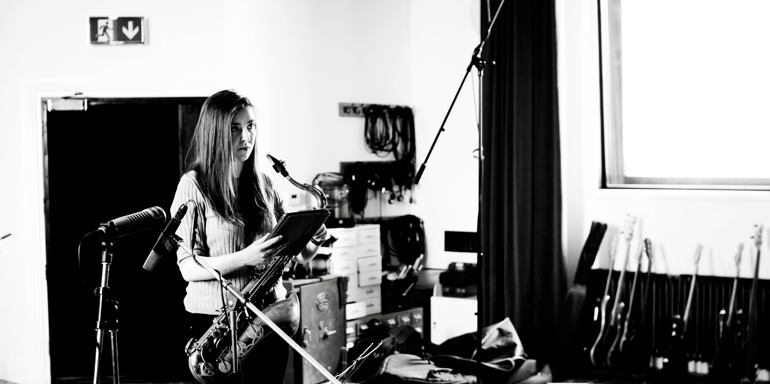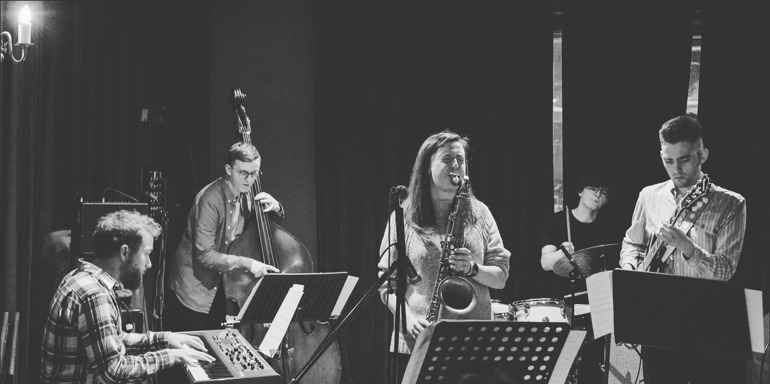
Photo Credit: Joe Collinson
Course Studied: BA Jazz
Year of Graduation: 2014
Top Career Highlights:
- Recording and releasing my debut quintet album Worry Not with the support of the Peter Whittingham Award from Help Musicians
- Playing in the horn section for Leicester champions Easy Life
- Gaining a place on the Abram Wilson Foundation Career Development Scheme
Emma Johnson is an award-winning saxophonist, composer and bandleader. Emma’s music has been played on BBC Radio 3 and her writing described as ‘a relaxed, melodic and distinctive style of contemporary jazz’.
Emma has recently been awarded the Help Musicians Peter Whittingham Award to record and release her debut album with cinematic quintet - Emma Johnson's Gravy Boat.
A versatile musician, Emma has worked alongside artists and bands including Easy Life, Gregory Porter, Olly Murs and Los Campesinos!
Here, Emma discusses her project Gravy Boat, collaborations with Nishla Smith and involvement on the Abram Wilson Foundation's Career Development Programme.
What attracted you to studying in Leeds and what do you think of the music community here?
In the build up to choosing where to apply to study, I looked around a load of different colleges and conservatoires. When I came to Leeds, I was just totally blown away by the energy and great feeling around the building and it felt like the place for me. I ended up having a gap year because I was so set on only wanting to come to Leeds and I’m so glad I made that choice – it was worth the wait!
I think the music community is strong and lovely and it only gets better the more people you meet. I was lucky to come out of Leeds Conservatoire with some great friends who I still play music with and it’s taken me a while to find the confidence to show up and get involved in the wider music community, but now that’s happening I’m really enjoying meeting and playing with different musicians too.
Tell us a little bit about your project ‘Gravy Boat’ – what prompted you to start this group?
Gravy Boat started as an outlet for my own compositions and I suppose it kind of still is that.
I sort of lost my way with writing music in the conservatoire, I think I was just so focused on getting my playing better and doing the course stuff that I didn’t do so much composing. When I left, I almost immediately realised it was something I’d been missing and so I started writing without a particular project in mind. Eventually, I put a band together to play the tunes and got a gig and then it’s kind of continued from there. For a while, it was more of a hang than a serious group, and then we got a place on Jazz North’s Northern Line Scheme and I realised it could be a real thing to play my own music as part of my career.
Since then, I’ve really put time into learning about different elements of the industry side of things that I was clueless about before and have really tried to be consistent with working on the music and building the group a little.
The group and my writing for it has a cinematic, melodic, contemporary sound which is absolutely brought to life by the four musicians I’m lucky enough to play with – Fergus Vickers on guitar, Richard Jones on piano, Angus Milne on bass and Steve Hanley on drums.
Our debut album Worry Not, is out from the 2 July 2021 and is inspired by worries, stress and dealing with them to find a sense of calm and happiness.
I’ve got to give a huge shout out to a couple of brilliant people: Amy Pearce who has taken so much time to share her wisdom and help me through this album process and Lucy Woolley, who has given me so much support and been so patient in helping me get to this point. We’ve been doing some coaching together through the pandemic which has been a huge help to me and I would really recommend to any artists who want to make a change of any kind in their career: www.lucywoolley.com/coaching
I think asking for help and advice, and admitting you don’t know something (or a lot of somethings) is a skill in itself, and one it took me a long time to build. I’ve found recently that people are so generous and want to help if you’re willing to a) ask and b) put the work in.

Photo Credit: Joe Collinson
What was the most important lesson you learnt during your time spent at Leeds Conservatoire?
Probably to make the most of the opportunities around you and that it’s on yourself to make things that you want happen.
I definitely didn’t realise these things fully until after studying and wish I’d made more of the practice time, the musicians that were around wanting to play and also thought more about what I actually liked doing and wanted to do instead of following the crowd a little.
I guess this comes back to the writing thing – I kick myself often that I didn’t get into a room and do writing sessions with some of the great musicians in that building, and that I didn’t get into using any kind of tech to write with sooner (starting my scoring/demo writing adventure in Logic many years later was a slow process!).
Jazz has historically been a male-dominated space. Do you think the situation is changing?
I think it is changing, if gradually, and a lot of brilliant people are helping that. The work that, for example, Women In Jazz have been doing to represent and promote so many artists that deserve the same recognition as their male counterparts is amazing, and their mission and the way they are going about it is so inspiring.
I talked quite a bit about this issue in an article that Abram Wilson Foundation did for International Women’s Day, and the words I always come back to on it are from fellow Leeds graduate and all round wonder Kim Macari, who wrote this phenomenal piece for Jazz Connective which I would recommend everyone read.
How did your opportunities for collaboration with musicians such as Nishla Smith arise?
Collaborating with Nishla was my first nudge into the fact that reaching out to work with people you think are good via the internet is easy and nice and the worst thing they can say is no, which isn’t so bad.
Exactly three years ago, Manchester bassist Josh Cavanagh-Brierley was hosting a Composer’s Jam (like a regular jam but you turn up with a chart to play with the house band), and Nishla and I were the guest composers. I was excited to be asked, but figured the vocalists would probably do their own songs and then instrumentalists would maybe take up most of the ‘jam’ bit. I had a song that was written with words but had only been performed as an instrumental up to that point, so I reached out to ask if she fancied singing it.
From there, we hit it off, guested in each other’s bands for a short series of gigs, and have been writing music together ever since. We released a track called Where Were You Hiding? during the pandemic (the song she sang at the jam night) and we’ve recently formed Night Porter, and are due to release our first EP as part of the Manchester Jazz Festival Originals Commissions this summer.
Nishla has totally inspired me and reminded me of what I love about music and collaboration. She never fails to make my ideas better and it’s always the best reminder for me to just ‘go for it’ in that I get to work with someone so talented and lovely, just from sending one email.

Photo Credit: Maria Alzamora
You work with the Abram Wilson Foundation, who aim to support and inspire talented musicians. Tell us about your involvement on their Career Development programme.
I was totally blown away to get a place on the Career Development programme this year. The work that the Abram Wilson Foundation do, both with artists like myself and also with young people who face barriers to music is incredible, and I’m so excited to be a part of it. Their list of alumni from the scheme is like a who’s who of the jazz scene at the moment, so I pinch myself a lot that I’m on there and just want to make the most of the opportunity. I’ve already learnt so much from the sessions with Jennie and Fred and can’t wait to keep moving forward as the album comes out and I work out what’s next.
Do you have one main focus or different elements that make up your career?
Recently, Gravy Boat has been taking up a lot of my time as self-releasing an album is a real juggle of a million things that I potentially hadn’t considered! However, I’m definitely more of a portfolio musician in that I have different outlets and various elements that make up my career.
There are three main components that make up my career which are:
- Gravy Boat – this is my main creative outlet and I put a lot of time into writing, rehearsing and trying to organise gigs, recordings and come up with new ideas for the group. Excited for the album to finally come out and see where it takes us!
- Horn Section Work – I love playing as a horn section and also working with bands to arrange their music for horns or work out what the addition of the horn section can do for their sound. I’ve had the fortune of playing sax and arranging music for all sorts of bands, from Leeds stalwarts Fold, Happy Daggers and Neon Dolls, all the way to Los Campesinos! and Easy Life, who I’m really excited to be working with at the moment
- Composing – From my work collaborating with Nishla as one half of Night Porter, to co-writing songs for different people, and writing library music and composing for a variety of different projects, this is the element of my career that was the first thing I ever wanted to do, but that has taken me the longest to get round to. I’m just starting to build up my work as a composer and am loving every moment of the learning process

Photo Credit: Ken Drew
What’s coming up next for you in terms of gigs or releases?
My debut album Worry Not is out on the 2nd July, and we’re celebrating that with a handful of socially distanced launch shows in July and then a full tour (TBA) in the autumn.
You can get your hands on the album and check out the dates here.
Following that, our first release as Night Porter for Manchester Jazz Festival should be dropping at the end of summer, which is terrifying and exciting in equal measure.
Fingers crossed I’ll be doing a few horn section related festivals and dates across the rest of the year, and then I’ll be on tour with Gravy Boat towards the end of 2021!







